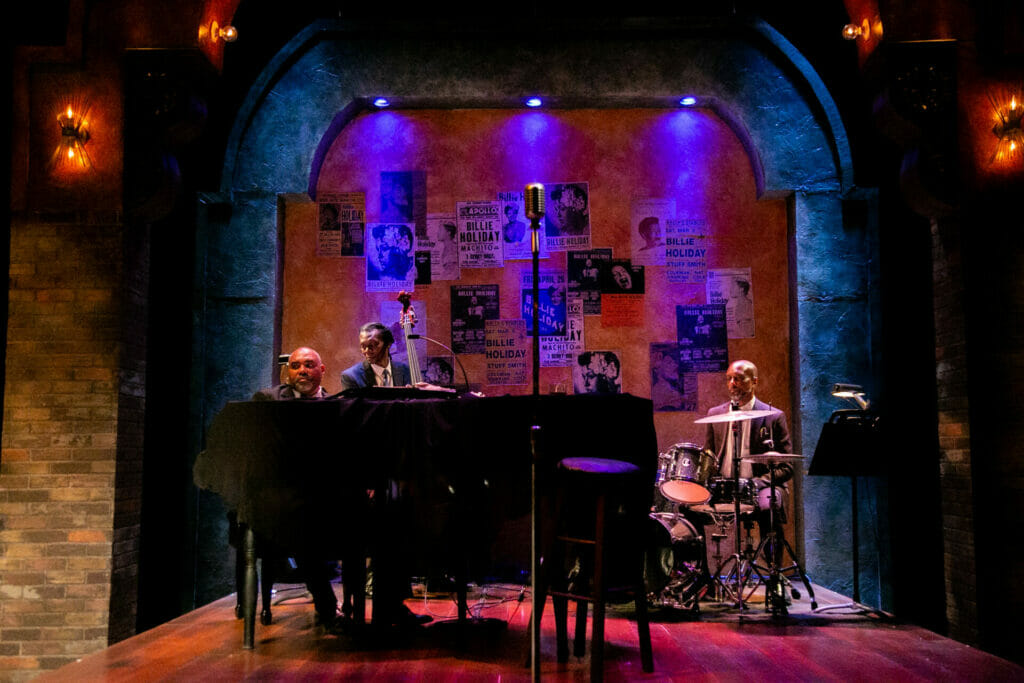The production of Lady Day at Emerson’s Bar & Grill, onstage at Theatrical Outfit through June 26, feels so intimate and real that members of the opening night audience began responding to the show like an actual Billie Holiday concert.
This is high praise, for the jazz legend died in 1959.
Yet Terry Burrell’s performance as Holiday in one of her final concerts is magnetic and captivating. When the 90-minute concert at a Philadelphia dive bar depicted onstage in the play starts to go awry for the fading legend, the audience in the theater started to applaud in support for what Holiday was going through and, one could sense, sympathize with what she was trying to say. It was that involving.
The lion’s share of credit for that time-travel effect should go to Burrell, who embodies the irritated, distracted yet still compelling diva as she sings great music and tells us about her life and struggles.
But the scenic design, once again by the remarkable Moriah and Isabel Curley-Clay, transports the audience into that bar. The room’s warm and soft lighting, designed by Rob Dillard, made Holiday’s silver gown glisten, flattering a singer whose health was in serious decline by March 1959, when the play is set.

Directed by Eric J. Little, the show does what it can to surround its audience with the beauty of the music and the nostalgia of the moment. That way, until Holiday reveals her scars — literal and emotional — onstage, Lady Day feels like a very confessional concert from a blunt-talking performer who’s stopped giving a damn about what anyone else thinks. The audience is her confidante, and it feels like we’re witnessing a historic moment.
A Broadway veteran and frequent Suzi Bass Award nominee, Burrell does very impressive work here, reprising a role she played at the Outfit in 2018. What does it take for a performer with a script to look naturally like they’ve gone off-script? Burrell does it. Her Holiday meanders, seems to doze off and even says the most horrifying of asides — casually mentioning her childhood rape — as though it’s normal talk.
Bandleader Jimmy Powers, played with concern and sweetness by accomplished jazz pianist and Kennesaw State University professor Tyrone Jackson. is the one who keeps Billie on task. He assures that she takes the stage, plays the hits and keeps the Emerson’s owners from getting into trouble with the police.
Of course, the songstress cannot be controlled or contained.
At that point in her career, even though she was only 44, Holiday had been through hospitalizations, bad marriages, time in prison and years of addiction to alcohol and heroin. She did not like Philadelphia and bemoans performing at Emerson’s, refusing at certain points to take the stage. The city was the site of her trial and conviction for drug possession, which led to her losing her New York cabaret card. That limited her opportunities to perform in the biggest city.
By the time Burrell appears onstage with her gloves nearly off and a tiny dog in her arms, the weight of the tragedy surrounding Holiday becomes clear. Yet that moment is still spirited and appealing, for Holiday’s sardonic sense of humor and talent are still present.

The music here is grand. It elevates the audience’s spirits throughout the show, as well, The other band members are Ramon Pooser on bass and Lorenzo Sanford on percussion. At one point in the middle of the show, which does not have an intermission, the musicians get a chance to riff with solos. And it’s a blast.
Lady Day features more than a dozen songs, including several of Holiday’s biggest hits. The love songs are delivered lightly, including “What a Little Moonlight Can Do.”
But the emotional power of “God Bless the Child” and “Strange Fruit,” delivered with wrenching feeling by Burrell, are the true highlights of the performance. Within them, the hurt that Holiday felt about her own childhood and the treatment she received in the South becomes glaringly clear.
Lady Day is a strange, affecting show because it becomes very difficult to detach the performer onstage from the real-life character that she embodies. Burrell’s work is lived-in and moving. It feels like she’s channeling Holiday. It shouldn’t be missed.
But it all exists as a tribute to Holiday, a performer who is beloved and yet was destroyed by a world that didn’t know how to nurture and care for her. She deserved better treatment than she received.
This script by Lanie Robertson received its first performance at the Alliance Theatre in 1986 before a production off-Broadway later that year. It didn’t debut on Broadway until 2014, when Audra McDonald won a Tony for the leading role.
Theatrical Outfit’s production of Robertson’s script honors the music and the heart of Billie Holiday with equal reverence. By the end of the show, the audience feels grateful for Holiday, Burrell and the strange theatrical magic that allows us to travel in time.
::
Benjamin Carr, a member of the American Theatre Critics Association, is an arts journalist and critic who has contributed to ArtsATL since 2019. His plays have been produced at The Vineyard Theatre in Manhattan, as part of the Samuel French Off-Off Broadway Short Play Festival, and the Center for Puppetry Arts. His book Impacted was published by The Story Plant in 2021 and is a Georgia Author of the Year Award nominee in the first novel category.

